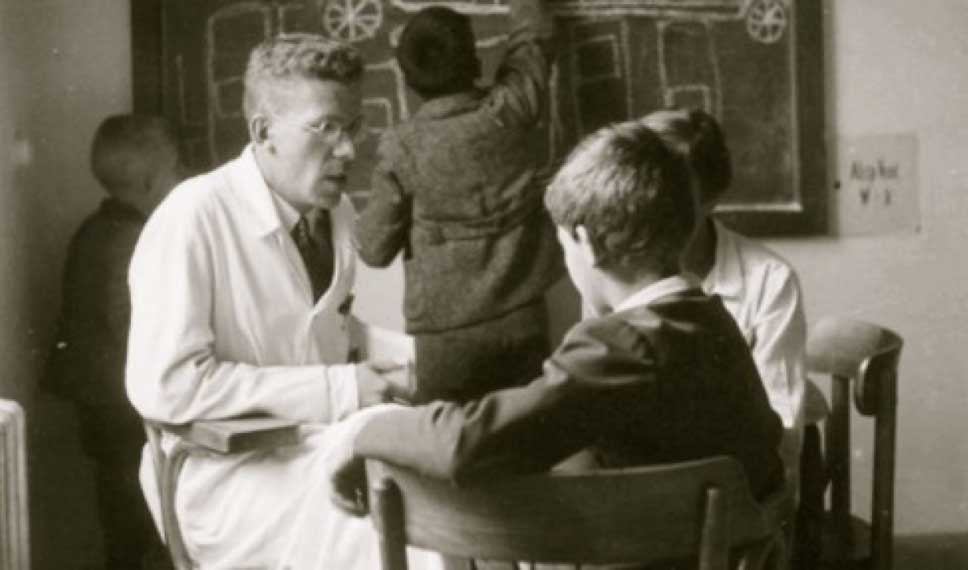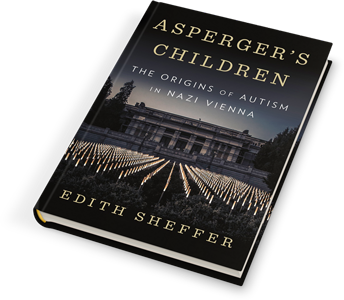BOOKS OF THE YEAR 2018
"...a deeply disturbing, thoroughly researched account that exposes the complicity of Hans Asperger in the murder of children suffering from what he called autistic psychopathy."
-The Times Literary Supplement
A groundbreaking exploration of the chilling history behind an increasingly common diagnosis.
Hans Asperger, the pioneer of autism and Asperger syndrome in Nazi Vienna, has been celebrated for his compassionate defense of children with disabilities. But in this groundbreaking book, prize-winning historian Edith Sheffer exposes that Asperger was not only involved in the racial policies of Hitler’s Third Reich, he was complicit in the murder of children.
As the Nazi regime slaughtered millions across Europe during WWII, it sorted people according to race, religion, behavior, and physical condition for either treatment or elimination. Nazi psychiatrists targeted children with different kinds of minds―especially those thought to lack social skills―claiming the Reich had no place for them. Asperger and his colleagues endeavored to mold certain “autistic” children into productive citizens, while transferring others they deemed untreatable to Spiegelgrund, one of the Reich’s deadliest child-killing centers.
In the first comprehensive history of the links between autism and Nazism, Sheffer uncovers how a diagnosis common today emerged from the atrocities of the Third Reich. With vivid storytelling and wide-ranging research, Asperger’s Children will move readers to rethink how societies assess, label, and treat those diagnosed with disabilities.

Doctor Hans Asperger with kids.

Inaugural lecture of Eduard Pernkopf, the new National Socialist dean of the University of Vienna Medical School, April 26, 1938.
With vivid storytelling and wide-ranging research, Asperger’s Children will move readers to rethink how societies assess, label, and treat those diagnosed with disabilities.

Praise for Asperger’s Children
“…what at first seems to be a book about Dr. Hans Asperger and the children he treated ends up tracing the sprawling documentary record of a monstrous machine…”
- Jennifer Szalai, The New York Times
Read More
“Edith Sheffer’s Asperger’s Children brings conceptual clarity and badly needed historical depth to a contemporary topic of ever-widening resonance and concern. Her careful and illuminating treatment deserves the fullest of public attention.”
- Geoff Eley, author of Nazism as Fascism
“Meticulously documented, and chilling in its detail, Edith Sheffer has accomplished two important goals in this riveting work. In Asperger’s Children, she provides evidence that one of the most renowned names in psychiatry and autism spectrum disorders was complicit, if not an indirect participant, in the greatest horror perpetuated on humans. She also challenges clinicians and educators to carefully consider the impact of assessment and diagnosis on the lives of children, by revealing the consequences of the most extreme abuses of clinical power and authority. In the current age of neurodiversity, this essential work will help to insure that the human rights of people with disabilities will never be disregarded again.”
- Barry M. Prizant, author of Uniquely Human: A Different Way of Seeing Autism
“With the ubiquity of autism in our neurodiverse world, the Viennese pediatrician Hans Asberger has become a cult hero. Indeed many would rather speak of “Asperger’s Syndrome” than autism just as we have replaced “mongolism” with “Down’s Syndrome.” In what will now the definitive study of Asberger and his relationship to the most nefarious aspects of Nazi eugenics, the selective murder of “defective children,” one of our most original historians of medicine Edith Sheffer has laid out the case against our idealizing of any physician without truly understanding their embeddedness in the complex scientific and political world of their time. An important, well-written and extremely timely book.”
- Sander L. Gilman, author of Seeing the Insane
“While he was certainly not a monster, of which there were many, Asperger was also no saint, nor was he the ‘resistor’ he subsequently claimed to be. While the subject matter of Sheffer’s book is depressing, her skills as a story teller ensure it is always gripping. This is a very valuable contribution to the relatively neglected history of Austria in the Third Reich, and perhaps more importantly, to the inadequacies of medical diagnosis.”
- Michael Burleigh, author of The Third Reich: A New History and The Best of Times, The Worst of Times: A History of Now
“This book is sensational, although its author does not seek sensation. It is a careful work of history, connecting the career of a physician with the intellectual, medical, and political contexts of Austria in the 1930s and 1940s. That world is not our world, but the connections, the habits of mind, speech, diagnosis, are more powerful than we think. In restoring history to psychology, Scheffer helps us to understand why we classify our children the way we do, and helps us to ask, as we must, just what kind of world we are making for them.”
- Timothy Snyder, author of Black Earth: The Holocaust as History and Warning and Bloodlands: Europe Between Hitler and Stalin
“Edith Sheffer is a superb guide to the complex and disturbing world of Nazi child psychiatry that produced the Viennese doctor Hans Asperger and his influential diagnosis of autistic psychopathy . . . The discussions of this widely known but imperfectly understood range of conditions today will be enlightened by this revealing book.”
- Norman M. Naimark, author of Genocide: A World History
"This is a revelatory, haunting biography of a gifted practitioner who chose to fall in line with the Nazi regime and the far-reaching consequences of that choice, for his own patients and for those still using and being labeled with the diagnostic concepts he originated.”
- Publisher's Weekly
Read More
“A tragic yet thought-provoking and extensively researched account that vividly portrays the child victims. This remains a cautionary tale of the influences on diagnoses and how dangerous they can be.”
- Library Journal
“This frightening record of science warped by Nazism will fascinate readers searching for new insights into WWII and those interested in the full story of autism.”
- Booklist
“A superbly researched account... long-overdue and gripping analysis... It’s hard to believe that anyone will want to identify with Asperger syndrome after reading Sheffer’s extremely disturbing but very lucid book.”
- Saskia Baron, The Guardian
Read More
“For success in science and art,” the Austrian pediatrician Hans Asperger once proposed, “a dash of autism is essential.” For success in medicine during the heyday of the Third Reich, as Edith Sheffer’s account of his career shows, the requirement was different.”
- Ann Hulber, The Atlantic
Read More
“Impeccably researched through medical notes and contemporaneous accounts, Sheffer's book focuses on pediatrician Hans Asperger, once championed for his work with children lacking social skills, who absorbed the Nazi regime’s obsession with purity and perfection. Psychiatry and “sociability” became categories of persecution, and Sheffer, in well-documented detail, relates how Asperger sent “inferior children” to a Vienna clinic where the treatment was euthanasia.”
- National Book Review
“Everyone in the autism community should read Asperger’s Children, though they may find parts of it terribly painful, especially the sections describing the horrors inflicted at Spiegelgrund. If you are an autism parent, you will recognize your children in the institution’s inmates. If you are autistic, you will recognize yourself.”
- Jonathan Rose, History News Network
Read More
“An absolutely terrifying and fascinating book”
- Steve Almond, NPR, Here & Now
Read More
“An impassioned indictment, one that glows with the heat of a prosecution motivated by an ethical imperative. [...] Sheffer dramatically incorporates the voices of the few children who survived the sadistic terrors of the psychiatric regime.”
- Lisa Appignanesi, New York Review of Books
Read More
“Edith Sheffer presents a well-researched and thoughtful examination of humanity at its worst. Her research delivers a face and personality to innocent children who were murdered because of their psychological disability.”
- Charles S. Weinblatt, New York Journal of Books
Read More
“Asperger was typical of what Sheffer calls the Third Reich’s “diagnosis regime”. Racial characteristics, religion and physical disabilities were all set down with lapidary coldness”
- Ian Thomson, The Guardian
Read More
“Edith Sheffer reveals a dark and hideous side to Hans Asperger….There is quite a move to have his name dropped from the psychologist's vocabulary…”
- Bob Brockie, Stuff
Read More
this superbly researched book is an important contribution to our understanding of attitudes to autism, and to our knowledge of one of the very darkest episodes in recent human history.”
- Julia Boyd, The Telegraph
Read More
"...remarkable, sad, disturbing but so very important book...”
- Donald Brackett, Critics at Large
Read More
"It illuminates not only the life of one of the most horrifyingly interesting of Nazi war criminals, but also the dark cavern of medical murder and cruelty, one of the monstrous aspects of Nazi social policy.”
- Terry Philpot, Wiener Library Blog
Read More
"By putting Hans Asperger’s career in Nazi Vienna under an unfavourable new lens, historian Edith Sheffer’s riveting and often devastating book, Asperger’s Children, may well accomplish what Asperger’s exile from the DSM failed to”
- Emily Donaldson, The Globe and Mail
Read More

In the first comprehensive history of the links between autism and Nazism, Sheffer uncovers how a diagnosis common today emerged from the atrocities of the Third Reich.
Recent press for Asperger’s Children
The Nazi History Behind 'Asperger'
By Edith Sheffer
March 31, 2018

PALO ALTO, Calif. — My son’s school, David Starr Jordan Middle School, is being renamed. A seventh grader exposed the honoree, Stanford University’s first president, as a prominent eugenicist of the early 20th century who championed sterilization of the “unfit.”
This sort of debate is happening all over the country, as communities fight over whether to tear down Confederate monuments and whether Andrew Jackson deserves to remain on the $20 bill. How do we decide whom to honor and whom to disavow?
Read More
The Nazi history of Hans Asperger proves we need a new word for this type of autism
By Matthew Rozsa
April 30, 2018

Back in 2012, the American Psychiatric Association voted to remove “Asperger Syndrome” as an official diagnosis in their manual. Their decision was based on terminological precision rather than ethical considerations; they felt that it ought to be folded into autism spectrum disorders and argued that merging it with the broader spectrum would “help more accurately and consistently diagnose children with autism.” Nevertheless, as Edith Sheffer’s new book “Asperger’s Children: The Origins of Autism in Nazi Vienna” points out, they wound up being ahead of the curve when it came to disassociating the condition itself from the name of Hans Asperger himself.
As Sheffer meticulously documents and proves in her book, Asperger collaborated with Nazi Germany in unforgivable ways. He gave public credence to their most toxic views on race and biology (known as eugenics), served as a medical consultant for Adolf Hitler’s administration and recommended that countless children be put to death at the Spiegelgrund, a clinic for “inferior” children. Many of Asperger’s career opportunities were given to him because of the racial privileges he was afforded in Nazi Germany, and although a narrative later emerged that depicted Asperger as an opponent of Nazism, the historical evidence demonstrates that he both sympathized with aspects of and personally benefited from Nazi ideology.
Read More
The truth about Hans Asperger’s Nazi collusion
By Simon Baron-Cohen
May 8, 2018

When Wing coined the term Asperger’s syndrome, none of us was aware of Hans Asperger’s active support of the Nazi programme. As a result of the historical research by Sheffer and Czech, we now need to revise our views, and probably also our language. Asperger’s Children should be read by any student of psychology, psychiatry or medicine, so that we learn from history and do not repeat its terrifying mistakes. The revelations in this book are a chilling reminder that the highest priority in both clinical research and practice must be compassion.
Read More
Review: Asperger’s Children: The Origins of Autism in Nazi Vienna by Edith Sheffer — a venerated doctor’s dark secrets
By Dominic Lawson
May 27, 2018

As Sheffer suggests at the end of her searing, wonderfully written book, the least that can be done to honour the memory of those children killed in his name is to excise it from popular use.
Read More
New research reveals that the physician behind Asperger’s syndrome was an active participant in Nazi eugenics
Meredith Wadman
June 11, 2018

On 1 July 1941, a young Austrian physician named Hans Asperger signed a document transferring a toddler named Herta Schreiber to Spiegelgrund, an asylum for mentally ill children on the outskirts of Vienna. Two-year-old Herta had suffered diphtheria and meningitis, leaving her severely disabled. She “must present an unbearable burden to her mother,” Asperger, then the director of the Curative Education Clinic at the University Children’s Hospital in Vienna, wrote on the transfer document. Herta’s placement at the asylum, called Spiegelgrund, was “absolutely necessary,” he directed.
A haunting photograph of the crying toddler, her head shaven, taken soon after her arrival at Spiegelgrund, is all that survives of Herta. The facility’s murderous medical director, Erwin Jekelius, a former colleague of Asperger’s at the university clinic, soon sought Reich authorization to kill the girl as part of the Nazi drive to rid the gene pool of undesirables. She died two months after her admission to Spiegelgrund, where the Nazis would kill nearly 800 children between 1940 and 1945.
Unlike the millions who were gassed, the killings of the Spiegelgrund children were prolonged and intimate, Edith Sheffer explains in her searing new book, Asperger’s Children. “Doctors personally examined the children they condemned. Nurses personally fed and changed [their] sheets…. Death came slowly, painfully, as children would be starved or given overdoses of barbiturates until they grew ill and died, usually of pneumonia.”
Read More
Hans Asperger's complex Nazi history
Kate Tuttle
June 15, 2018

What we now call autism has surely been a part of the human condition for as long as human beings have existed. But the way different cultures understand, talk about and treat people who exhibit the symptoms of autism — difficulty or disinterest in social interactions, repetitive behaviors and language impairments — can vary widely. After all, writes historian Edith Sheffer, “diagnoses reflect a society’s values, concerns, and hopes.” In “Asperger’s Children: The Origins of Autism in Nazi Germany,” Sheffer tells the story of the Hans Asperger, a child psychiatrist in Austria whose work before and during the Third Reich led to a broader definition of autism.
For decades, Asperger’s syndrome was the label given to children like those he had treated at the University of Vienna’s Children’s Hospital. Far from the much more severely affected patients described by Leo Kanner, the Johns Hopkins psychiatrist who first wrote about autism in the United States, these children were often intelligent, even brilliant. The idea that autism could mean difference rather than disorder, that neurodiversity could represent a source of strength, stemmed in part from his work in curative education, a field that came from the cosmopolitan, leftist milieu of Vienna between the world wars. Because he emphasized the value of treating the whole child and respecting individual children’s differences, Sheffer notes, “Asperger is often portrayed as a champion of neurodiversity.”
And yet, Sheffer goes on, “it is time to consider what Asperger actually wrote and did in greater depth.” In this compact, restrained and ultimately devastating book, Sheffer does just that. A shy and bookish child, Hans Asperger grew up to love science and nature, hiking and mountain-climbing, and the conservative Catholicism of his youth. He attended medical school in Vienna, which World War I had left “a cauldron of social upheaval, political strife, and economic catastrophe.” A progressive welfare state sought to improve citizens’ lives through improvements in public housing, education, and healthcare. Alongside what reformers lauded as “positive” eugenics, of course, came the negative variety: even before the Germans occupied Austria, officials there were advocating for the sterilization of “the inferior.”
Read More
UC Berkeley historian exposes Hans Asperger as Nazi-era autism doctor who sent kids to their deaths
Martha Ross
June 27, 2018

After UC Berkeley historian Edith Sheffer learned that her 17-month-old son had autism, she did what many parents in her situation do: She read everything she could.
And like many parents, Sheffer soon came across stories about Hans Asperger. In autism circles, he’s long been known as the pioneering Viennese doctor whose name became synonymous in the 1980s and 1990s with a more “favorable” view of autism and its high-functioning variations.
Back in World War II Vienna, Asperger described qualities that are popularly used to explain socially awkward, single-minded math and science whizzes. At various points, people have tossed around the term “Asperger’s” to explain the unique talents of Albert Einstein, Bill Gates, Steve Jobs or Mark Zuckerberg.
“It’s become a way to confer superhuman status on people,” Sheffer, who lives in Palo Alto, said in an interview. “In Silicon Valley, it’s almost a badge of honor.”
But in her new book, Sheffer doesn’t tell a story about Asperger’s contributions to pediatrics or psychiatry.
Read More
The Horrifying History of Hans Asperger
Martha Ross
June 27, 2018

A new book by Bay Area scholar of German history Edith Sheffer tells a detailed, grisly story of the Nazi disability death machine and the role within it played by Hans Asperger, the Vienna clinician for whom the now defunct diagnosis of "Asperger's Syndrome" was named. "Asperger’s Children: The Origins of Autism in Nazi Germany" is a chilling masterpiece of modern history, embroidered with layers of detail and insights that make it an invaluable resource for anyone wishing to understand how the Nazi creed of racial hygiene resulted in the unspeakable horror of the sterilization, torture, and murder of countless thousands of children and adults with physical and mental disabilities.
Read More
'A Nazi in all but name': Author argues Asperger's syndrome should be renamed
Padraig Moran
August 14, 2018

The Austrian pediatrician for whom Asperger syndrome is named doesn't deserve the honour of that title, because he collaborated with Nazis to euthanize children, according to a professor.
Hans Asperger conducted pioneering research into what he termed "autistic psychopathy" during the Second World War in Vienna, but was also involved in screening children in line with Nazi policies on eugenics.
"He did argue that some children could be redeemed ... but he did diagnose a number of children as ineducable, as did his colleagues, and they would be sent to Spiegelgrund for observation," Edith Sheffer told The Current's guest host Laura Lynch.
Read More
How historian Edith Sheffer unmasked the monster who identified Asperger's
Sally Blundell
October 1, 2018

When University of California historian Edith Sheffer was told her 17-month-old son, Eric, was on the autism spectrum, she decided to find out more about the man whose name has since been given to her child’s condition. She knew Austrian physician Hans Asperger had defended disabled children from Nazi persecution, using the autism diagnosis as a kind of “psychiatric Schindler’s list”, and never joined the Nazi Party.
But in researching the “heroic story of Asperger”, she found this so-called champion of neurodiversity was not only complicit in the racial hygiene policies of the Third Reich but also played a key role in the systematic killings of disabled children.
Read More
For all press related to Asperger's Children & Edith Sheffer, please visit this page.
In this groundbreaking book, prize-winning historian Edith Sheffer exposes that Asperger was not only involved in the racial policies of Hitler’s Third Reich, he was complicit in the murder of children.

About the author: Edith Sheffer
Edith Sheffer is a historian of Germany and central Europe, and a Senior Fellow at the Institute of European Studies at the University of California, Berkeley.
Other Books:
Sheffer's prize-winning Burned Bridge: How East and West Germans Made the Iron Curtain, challenges the moral myth of the Berlin Wall, the Cold War’s central symbol — revealing how the Iron Curtain was not simply imposed by Communism, but emerged from the everyday actions of ordinary people.

Edith Sheffer ©



